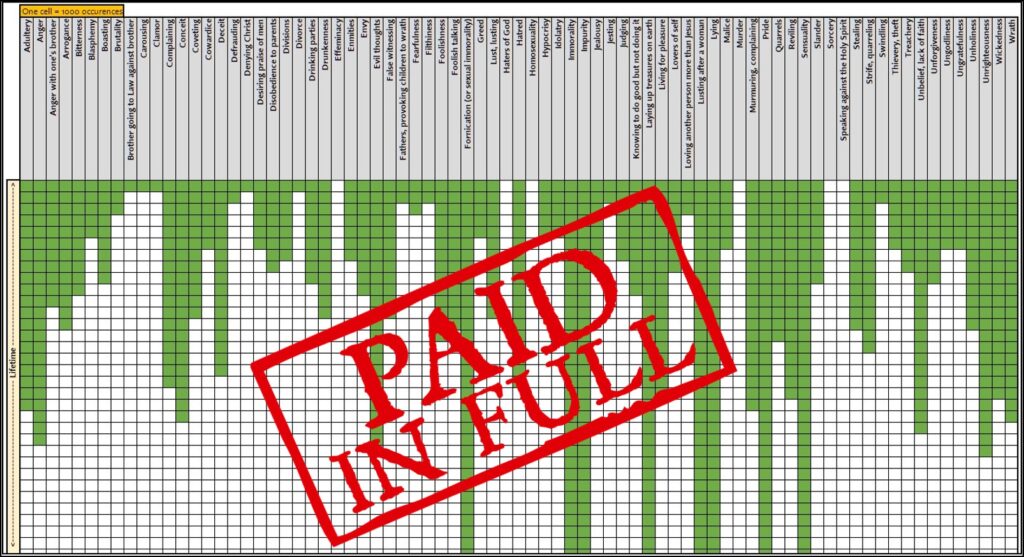Unveiling the Core of Mankind’s Struggle
The journey to understanding the immeasurable gift of God’s grace begins with recognizing the serious predicament we all face: the separation from God due to our sin. But what does this mean for us, and how can we bridge this divide?
In this article, we will explore the biblical teachings on sin, judgment, and salvation through Jesus Christ. By examining the reality of human guilt before God and the extraordinary sacrifice that Jesus made, you’ll discover the true meaning of grace and why it’s our only hope for reconciliation with God.
The Record of Sin: A Grim Reality
The Bible clearly teaches that every action we take is subject to God’s judgment. To grasp the seriousness of this, picture a detailed spreadsheet listing every sin you’ve ever committed, from the moment of your conception to your final breath. It might look something like this:

This isn’t just an abstract idea—God’s Word tells us that “every work” will be brought into judgment. It’s a comprehensive record of our lives, an undeniable list of offenses against God’s law.
Facing Judgment Without Excuse
When the time comes to stand before God, the list of our evil works will act as court charges—evidence of every sin we’ve committed, whether glaringly obvious or hidden deep within us. You’ll recognize many of these charges, such as instances of lying. However, some of your evil works may not be immediately apparent, like the times you were prideful and overvalued yourself. But the truth will be plain to see. There will be no argument about our guilt.
The Ineffectiveness of Good Deeds and Penance
When you stand before God, there will be no debate about your guilt. Both you and God will have a clear and undeniable understanding of it. You might say:
- “But I was a good person most of the time!” Yet, that doesn’t erase the sins you’ve committed. Imagine being pulled over for speeding 100 MPH in a 60 MPH zone. The law deems this reckless driving. If you told the officer you usually drive the speed limit, it wouldn’t erase the fact that you’ve broken the law on this occasion, and you are responsible for the consequences of this offense. Similarly, being a good person most of the time cannot erase your sins in the eyes of God.
- “But I paid for those sins through good deeds or penance!” you might argue. However, the court doesn’t grant forgiveness based on such actions. Consider this analogy: Suppose you received a citation for reckless driving and now must go to court. You might tell the judge, “Your Honor, I felt so guilty about my reckless driving that I volunteered my time to help the needy and donated money to support them.” But a judge wouldn’t pardon a reckless driver based on their charitable donations. And God doesn’t grant forgiveness through good deeds nor penance. Instead, God’s law requires a specific payment—one that only Jesus Christ can provide.
The Consequences of Sin: Two Paths
At this point, your case in God’s court can take one of two directions:
The Default Path: Judgment and Separation
Without intervention, God will sentence you to eternal separation from Him in hell, where you will spend eternity paying for your sins. In this place, you will be forever separated from God, existing in a realm devoid of good. The Bible warns that not everyone who calls Jesus “Lord” will enter the kingdom of heaven; only those who do the will of God, which is to believe in Jesus Christ, will be saved. Consider these verses:
Not everyone who says to Me, ‘Lord, Lord,’ will enter the kingdom of heaven, but only he who does the will of My Father in heaven. Many will say to Me on that day, ‘Lord, Lord, did we not prophesy in Your name, and in Your name drive out demons and perform many miracles?’ Then I will tell them plainly, ‘I never knew you; depart from Me, you workers of lawlessness!’” – Holy Bible, Matthew 7:21-23
The will of the Father is for us to believe in Jesus Christ and accept the forgiveness made available through His death on the cross. Notice that those in the verses did not say, “Lord, Lord, did we not have faith in Jesus?” Instead, they emphasized what they had done. Be very mindful not to believe that your works can save you—your faith in Jesus saves you. Believing that your works can save you essentially nullifies the tremendous sacrifice Jesus made.
The Path of Blessing: Salvation Through Jesus Christ
The Good News—referred to as the “Gospel” in the New Testament—is that Jesus Christ has already paid the price for your sins in full. His sacrifice on the cross is the only acceptable payment for our sins. As the Holy Bible, Hebrews 9:22 tells us, “Without the shedding of blood, there is no forgiveness of sins.” Jesus has washed us clean through His death, and it’s through this act that we can enter eternity with God. This substitutionary payment is the only acceptable one—not your own goodness, nor your good works, nor penance. Jesus has paid your debt in full!

The Gift of Grace: Saved Through Faith
Ephesians 2:8 emphasizes that salvation is a gift from God, rooted in His grace and not our works. Grace—God’s unearned, undeserved, unmerited favor—is the sole source of our salvation. It is not about being good or performing religious acts; it’s about believing in Jesus Christ.
The letter to the Ephesians in the Holy Bible underscores the fundamental concepts of Christianity. In Ephesians 2:8, it says: “For by grace you have been saved through faith; and this is not of yourselves, it is the gift of God.” Being saved from sin is an expression of God’s favor.
When Paul declares that the source of salvation is ‘grace,’ God’s favor, he highlights two key points:
- The solution to our separation from God is rooted deeply in the heart of God. It flows from His unmerited, unearned, and undeserved love. His infinite lovingkindness is the sole cause of our salvation.
- God saves us not through the works of the law (such as being a good person or performing penance), but through faith in Christ Jesus.
Why Do Good? Understanding Motivation for Righteousness
If we are saved by grace, does that mean we can live however we want? Far from it. True faith in Jesus transforms us from the inside out. While we are saved by grace, not by works, grace motivates us to live a life that pleases God. It’s not a license to sin but a call to live a new life in Christ.
I remember when I was in the Navy and was asked what my faith was. I answered “Christian,” but in reality, my life did not reflect that. To identify as something, one must first meet certain qualifications. For example, I can express 71/100 as a decimal, but that doesn’t make me a mathematician. I can play “Chopsticks” on the piano, but that doesn’t qualify me as a musician. In the same way, if someone calls themselves a Christian but does not embody the beliefs and practices of Christianity, they are not truly a Christian.
When you visit Arlington National Cemetery, each headstone is engraved with a symbol reflecting the answer to that same question: “What faith are you?”. Many headstones bear the cross, but that doesn’t necessarily mean every individual with a cross was a devout Christian.
Here’s the key: while salvation is indeed by grace alone, true faith in Jesus Christ naturally transforms our hearts and lives. Grace is not a license to sin but a catalyst for change. If a person qualifies to call themselves a Christian then they they won’t do whatever they want. They’ll try to live in a way that pleases God. They will fail, and will fail often, but as Romans 5:20 says “…where sin abounded, grace did much more abound.”

Reconciling Grace and Good Works
For years, I struggled with the concept of grace versus works, constantly feeling inadequate because I couldn’t meet the law’s demands. I thought my failures meant I wasn’t saved. However, Romans 7:1-6 revealed to me that I have been set free from the law’s burden.
One day, overwhelmed and at my breaking point, I took a day off work and went to my community pool. With my Bible in hand, I read Romans 7:1-6 repeatedly, knowing the answer was there but struggling to grasp it. Then, I decided to make the passage more personal to my situation. I changed the pronouns to me and my wife, and that’s when everything clicked. It made me understand grace vs works. I recommend you do the same.
Romans 7:6 set me free from the burden of feeling like I had to “be good” in my own strength. It brought clarity and peace, helping me understand that my salvation is not dependent on my ability to be perfect but on God’s grace through Christ. Christ’s death freed me from trying to earn my salvation. Now, I serve God out of love and gratitude, not obligation.
Conclusion: Freedom Through Christ
The Bible says, “So if the Son sets you free, you will be free indeed.” – Holy Bible, John 8:36
Salvation does not from our own efforts or how well we adhere to the law. We no longer need to worry about our own goodness or the frequency of my failures. God’s favor, the true blessing brought to humanity by Jesus Christ, is what truly matters.
Related content: Sins Forgiven and Going to Heaven—how can I guarantee my eternal destination? Both discuss God’s favor albeit in a different manor.
AI did not write this article but assisted with proofreading.
